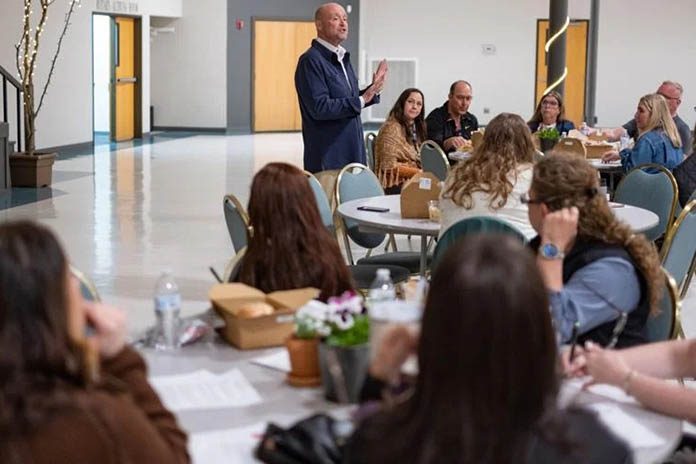
Rep. Greg Smith, R-Heppner, told the crowd Wednesday, March 27, at the Hermiston Chamber of Commerce’s luncheon they could ask him any questions they had.
While Smith mentioned the governor’s housing package, the decisions on campaign finance reform and modifications to the Legislature’s rainy day fund, it was the changes to Ballot Measure 110 that held the audience captive for much of the luncheon, sparking question after question.
Attendees focused on the details of the changes to Measure 110, which originally decriminalized possession of small amounts of narcotics and which people generally thought would prioritize treatment. However, many Oregonians did not see that happening in practice and called for changes.
Legislators came together to create a new, unclassified misdemeanor that offers people in crisis the chance to choose to go to either jail or treatment and is meant to balance a carceral or legal response and a behavioral health response.
Jackie Linton, Hermiston city councilor who is running for mayor, asked Smith what would happen if the person in crisis had committed another crime, such as breaking-and-entering, while high — would that person still be offered treatment?
Smith said in that case, the expectation would be for the person to go to jail and face prosecution for the crime they committed while experiencing their crisis.
Another resident asked about what treatment looks like. Smith said they tried to “build in discretion” for local governments and law enforcement officials and behavioral health specialists to make those decisions.
There is a “third strike” component to the new bill. After two encounters with law enforcement involving drug possession or use, for which the individual can choose between jail or treatment, the third time becomes mandatory jail and mandatory treatment.
“Someone who’s dealing with hard addiction,” Smith said, “they’re going to fail. There’s going to be failures.”
The point, he said, is to balance justice and mercy, or basically the stick and the carrot.
Linton said she was glad she attended.
“He went into great detail on the issues,” she said. Linton said she appreciated the points he made and the information he provided. Her opponent in the mayoral race, Doug Primmer, was also in attendance.
Umatilla County Commissioner John Shafer said he attended to get a sense of what matters to residents and hear Smith’s thoughts on how the legislative session went.
Hermiston Mayor Dave Drotzmann, Wallowa County Commissioner John Nash, and Jim Doherty, a former Morrow County commissioner, attended as well. The three are running to take the spot of Sen. Bill Hansell, R-Athena, in representing Senate District 29.
“I think that was great that they were all here as well,” Shafer said, “because they got to hear what issues are important to us, too.”
Smith, in addition to answering the audience’s questions on Measure 110, gave an overview of the makeup of the Legislature and discussed the value of compromise and collaboration, given the political makeup of the House and Senate.
Although he never directly called out his Democratic colleagues, he did allude to their positions and decisions creating or adding to the housing crisis across the state. He also referenced the power they have in regard to decision making as the majority party.
In the end, though, he emphasized that many of these decisions, like that of Ballot Measure 110, take time to change.
“It took us years to get into this position,” he said, “it’s going to take us years to get out.”
In addition to updates, Smith also gave a mini-lesson on civic structure and responsibility.
Part of the government’s responsibility is to decide how to spend money while keeping a balanced budget, he said. Spending a dollar in one place means that dollar is no longer available for another project.
The population continues to grow and costs rise, among other factors, thus forcing the budget to increase.
“The only way to reduce government is to reduce service,” Smith said.
He asked the audience to consider what they value most between education, health care and public safety, and said those are often the challenging decisions legislators face.
“Whoever you elect in the future,” he said, “those are the tough questions you have to ask them.”










